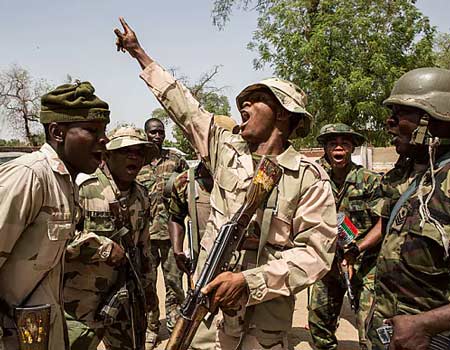149 Nigerian soldiers in trouble for uploading photos on social media
A newly-introduced social media code of ethics for members of the Nigerian military has recorded some of its earliest sanctions, PREMIUM TIMES has reported.
The newspaper obtained details of at least 149 personnel who were penalized for violating a section of the guidelines within the first three months after they came into force.
The affected service members, the majority of whom are non-commissioned officers, were accused of uploading pictures of themselves in military fatigues on social media, an act considered offensive under the guidelines issued in June 2018.
A breakdown of the sanctions shows 33 naval officers were found wearing their uniforms in fresh social media uploads, 40 soldiers were caught in the same act while 76 members of the Nigerian Air Force were affected.
The errant naval personnel comprised 15 commissioned officers and 18 ratings. Ten of the 40 Nigerian Army personnel are commissioned officers, with captain as the most-senior rank, while the remaining 30 are soldiers. The Air Force saw 17 of its officers and 59 non-commissioned officers identified as violating the social media guidelines.
The 10-page guidelines, published by the Defence Headquarters, imposed by Chief of Defence Staff, Gabriel Olonisakin, on June 11 sought to curb the undignified use of social media by members of the armed forces, especially acts that could render them susceptible to enemies’ trap or jeopardize ongoing military operations.
“Personnel should not post their pictures or those of their colleagues in military uniforms, or pictures containing military structures, platforms, and other military-related items,” said one of the slew of cautions in the guidelines.
The guidelines also included a ‘Dos and Don’ts section, which encouraged officers to always ‘like’ postings by all institutions of the armed forces but must not use social media languages such as “LWKMD, LMAO, LOL, OMG, BRB in professional posts.”
Military personnel were also required to warn their family members against controversial conducts on social media.
“Personnel will be held liable for any security issues arising from postings in respect of them by civilian friends or relations. They are, therefore, to educate their friends and relations as necessary regarding military security and what should not be posted on social media,” the guidelines said.
Officers court-martialled
Although the guidelines did not contain potential punishments for specific offences, there was a provision that said all officers would be punished as prescribed by the Armed Forces Act or the Cyber Crime Act.
The 149 officers were those caught between June 11 and September 18 by the Defence Headquarters.
It was not immediately clear how many of the 149 personnel have been disciplined for breaking the no-uniform-on-social media rule, but military spokesperson, John Agim, said he was aware arrests had been made.
“Some persons have been arrested for violating the guidelines and are currently being court-martialled,” Mr. Agim, a brigadier-general said. “But only their lawyers could say the kinds of punishment involved.”
PREMIUM TIMES could not immediately identify the persons rendering legal assistance to the embattled military officers.
A senior military officer told PREMIUM TIMES some of the affected officers could be compelled to proceed on early retirement, dismissed or even sentenced to jail, depending on the context of their violations.
“The armed forces is not where you commit wrongdoing and try to bribe your way out, you will receive maximum punishment as appropriate,” the top personnel said.
‘Pushed to the wall’
The Nigerian military has been on the defensive in recent years, as many officers, including those fighting Boko Haram in the terror-ravaged North-East, are taking to social media to ventilate on issues bordering on their welfare.
The military personnel, mostly soldiers, have been reported in the media as sending out anonymous pictures of the poor food they are being fed. Some have complained about how their salaries and allowances were being depleted by commanders, allegations that often received a strong rebuttal from top military brass.
One of such instances came in February when some officers who said they were engaged in the Boko Haram war alleged gross maltreatment by military authorities. The officers called on the Nigerian public and President Muhammadu Buhari to urgently intervene in their situation or risk allowing the counter-terrorism efforts to deteriorate.
The Army swiftly responded to the anonymous complaints at the time with a call for disgruntled elements to abandon service. It also said those raising the concerns were sponsored by politicians, although no proof was provided to substantiate the claim.
Nigerian military personnel are also known to have regularly used social media to mourn the death of their fallen colleagues, even when the military had not formally notified their loved ones.
All these acts have “pushed the military to the wall”, Mr. Agim said. “But it is not only in Nigeria, but other countries are also imposing measures to discourage their military officers from revealing too much information on social media.”
It was not immediately clear how many militaries across the world have imposed social media guidelines, but Western countries, including the United States, which Mr. Agim said had such measures in place, do not appear to have prohibited uploading of pictures in military uniform on social media.
“There is no such policy,” a U.S. Air Force officer told PREMIUM TIMES Sunday, preferring not to be identified in print. “We can post pictures on social media in uniforms…except on AORs (areas of responsibility) that are considered combat and sensitive.”
“Military [officers] can post photos on social media provided nothing in the posts endangers troops, reveals locations, mission operations or troops movements,” the officer said.
India appears to have military guidelines which bear similarities with Nigeria’s, but this was imposed in 2016 after a senior military officer was enmeshed in a ‘honey trap’ scandal linked to the Pakistani intelligence agency.
The military in India forbids personnel from opening pornographic contents on social media, as well as setting pictures of themselves in uniform as their social media profile. But it did not place an outright ban on uploading pictures with uniform online.
‘No harm intended’
Mr. Agim said the rules were not intended to harm the officers or over-police their social media activities, but Nigeria is facing serious security challenges which the military has been at the forefront of bringing to an end.
“It is a challenging face we are in terms of security,” Mr. Agim said. “We have the responsibility to take measures that will protect all members of the armed forces who would, in turn, protect the country as a whole.”
An Abuja-based lawyer, Ken Asogwa, said even though it might be difficult to hold a balanced position on the matter, the military does not seem to have done anything fundamentally wrong with its guidelines on social media conduct.
“The truth is that the military officers are human beings like everyone and the Constitution guarantees their fundamental rights,” Mr. Asogwa told PREMIUM TIMES. “But since they have signed up to the codes of the military, they are statutorily bounded to comply by the social media guidelines.”
“If you think the military authorities are abridging your fundamental rights, you leave there and enjoy your rights elsewhere. But since you have signed up to the military code, it is not too much to expect you to comply with their rules, especially when such rules are drafted for security reasons,” he said.
Mr. Asogwa said even private firms are increasingly issuing guidelines defining how their staff members should conduct themselves online, suggesting it would be unfair to single out the military because it is a public institution.

